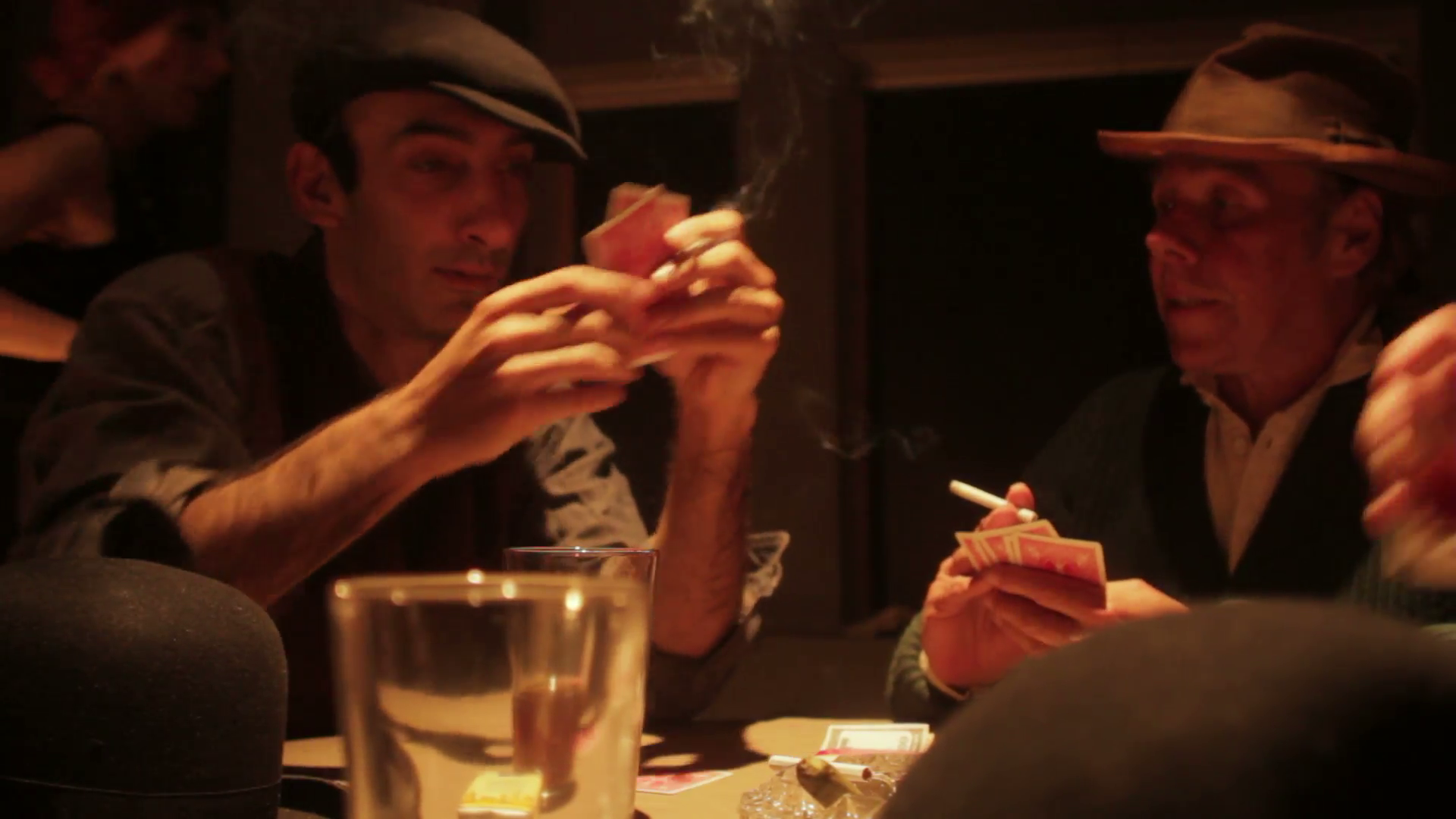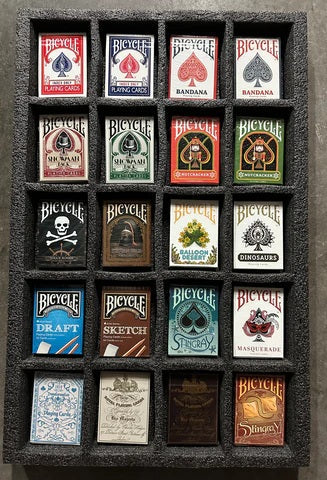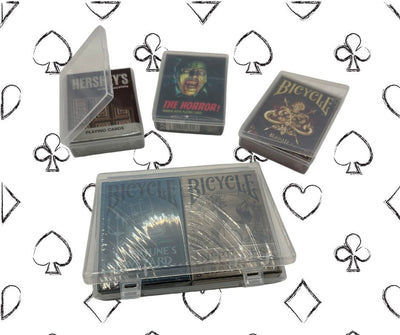Expressions and idioms derived from playing cards and card games
by BoardGameGeek reviewer EndersGameAs the English language has developed over time, many expressions have entered common usage, which give meanings to words quite different from the literal meanings of the individual words themselves. When this happens it is referred to as an idiom, which is a phrase that doesn't always follow the normal rules of meaning and grammar.
Many idioms have their background in older phrases that have changed over time, or originate in specialized areas and have come to have a broader usage. So it's no surprise that a lot of idiomatic expressions in English originate in the world of playing cards and card games like Poker. Not every expression that might seem to be playing card related is necessarily so; for example the idiom "call a spade a spade" actually originates in a first century Greek writing, well before playing cards even existed!
But many expressions and catch-phrases do originate with playing cards and card games, and this just goes to show the tremendous impact that cards and games have had on our culture. In fact, language usage like this is often used by sociologists, anthropologists, and historians, to measure how widely known card games were, because their use in language is clear evidence of their cultural importance and significance.
So let's learn how card games haven't just put cards into our hands, but have also put phrases and expressions into our English language!
● Above board
What it means: Honest and straightforward, not secret or deceptive.
How it originated: When playing a game of cards, players would show that they were not cheating by keeping their hands above the table, which was originally called a "board".
● Have an Ace (or card) up your sleeve or Ace in the hole
What it means: Something important held in reserve, which others aren't aware of, and can be used to your advantage at the right time.
How it originated: Magicians or cheaters at cards would sometimes literally have a card up their sleeve, that they would sneakily pull out at the appropriate moment. Similar is an "Ace in the hole", which originates in Poker. Since an Ace is the strongest card, and your "hole" cards are hidden and known only by you, having an Ace in the hole means you have a hidden advantage that becomes known when revealed later in the game.
● All bets are off
What it means: The outcome of a situation or event is unpredictable.
How it originated: When a game situation is uncertain, for example after an unexpected change, then no players would take any bets due to the uncertainties.
● Ante up
What it means: Pay the money for something.
How it originated: An ante is the amount of money you put on the table as your bet at the start of a card game.
● Come up trumps
What it means: To successfully achieve a better-than-expected outcome.
How it originated: In card games, trump cards beat all other suits.
● Deal in
What it means: Include someone.
How it originated: In a card game, the playing cards are "dealt" to all the players, so to be dealt in means to be part of the game.
● Dealt a bad hand
What it means: Have bad luck, or receive a disadvantage.
How it originated: No matter how skilful you are, if you are dealt a hand of bad cards, this is hard to overcome!
● Few cards short of a deck or Not playing with a full deck
What it means: Unintelligent, mentally deficient, somewhat crazy or simple.
How it originated: A deck that has several cards short is obviously incomplete, and can't function properly for a card game.
● Follow suit
What it means: Follow someone else's actions or example, and do what they have done.
How it originated: Especially in trick taking games, players are often required to play a card of the same suit as the person who plays first in a hand.
● Hold all the cards or Hold all the Aces
What it means: Be in a strong position, with all the advantages.
How it originated: If a player held all the Aces - usually the strongest card - or a winning hand, they had a very strong advantage, and the best chance of winning.
● House of cards
What it means: Something unstable, badly put together, and easily destroyed.
How it originated: Building a literal house of cards can be a fun activity, but the result is usually very fragile, and an accidental bump in the wrong place will cause the entire structure to fall.
● In spades
What it means: To have something in a large amount, or an extreme degree, as much or even more than you'd want or need.
How it originated: The highest ranking cards in Bridge are the Spades, so if you had cards in Spades you'd be in a good position.
● In the cards
What it means: Possible, likely.
How it originated: This originates in the practice of using playing cards (especially Tarot cards) are sometimes used for fortune-telling, to predict the future.
● Joker in the pack
What it means: An unexpected and unpredictable variable that could have a large impact.
How it originated: In many card games the Joker is a "wild card" that can be used as any card, and therefore can be a real game-changer.
● Lay your cards on the table or Show your hand
What it means: Be open, and honestly reveal your intentions or resources for all to see.
How it originated: Games like Poker involve a showdown where players need to reveal their hand and show what they have; prior to laying your cards on the table, or showing your hand, your strength is secret and unknown, and even subject to bluffing.
● Lost in the shuffle
What it means: Overlooked or bypassed, often in a busy setting or crowded circumstances.
How it originated: The aim of shuffling, naturally, is to lose cards in a deck, so that their position isn't known or immediately identifiable.
● Overplay your hand
What it means: Overestimate the strength of your position.
How it originated: This is a result of thinking that the cards in your hand are of greater strength and value than is actually the case.
● Play your cards close to your chest
What it means: Be very secretive or cautious.
How it originated: By literally keeping your cards close to your chest, there is less chance that other players will see them, and discover the strength of your hand.
● Play your cards right
What it means: Make the best use of your opportunities to achieve the greatest success possible.
How it originated: Winning a card game requires more than having a good hand - you also need to play your cards right, by deciding when and how to play them.
● Play your last card
What it means: Make a final or last-ditch effort.
How it originated: Playing your last card means that after this play, you have no more resources to use.
● Poker face
What it means: A expressionless face that gives no indication of feelings or emotions.
How it originated: This is an essential skill in poker, since good players will look for subconscious "tells" in their opponents that might give away what cards they have or whether they are bluffing.
● Showdown
What it means: A decisive confrontation or contest.
How it originated: A showdown is the moment in a game of poker when players reveal their cards to determine the winner.
● Stack the deck or Have the cards stacked against you
What it means: Arrange things to create an unfair situation; or to have things unfairly arranged against you so that you are disadvantaged.
How it originated: "Stacking" a deck of cards means that it has been prearranged in a particular order, which could be done deliberately to disadvantage a player when they are dealt out.
● Strong suit
What it means: Your strong suit is something you are good at or know a lot about.
How it originated: In a game of cards, a strong suit is the one that you have the most cards of in your hand.
● Trump card
What it means: A decisive factor or final resource, often held back, and used to attempt to win if nothing else works.
How it originated: Trump cards beat all other suits in a typical card game, and are often deployed strategically and held in reserve.
● Up the ante or Raise the stakes
What it means: Increase what is at stake in a discussion or dispute; this can be by increasing your commitment or involvement, or by increasing the importance or danger.
How it originated: The ante is the money you put on the table as your stakes at the start of a card game.
● Wild card
What it means: Someone or something with unpredictable or uncertain qualities, which could yet have a big impact.
How it originated: Similar to a Joker, in a card game a Wild Card is a playing card that can have any value or suit chosen by the player.
So now you're ready to return to real life, armed with some new vocabulary. Some decks of cards will even include clever one-liners that make reference to idiomatic expressions like these, or have clever quotes on the tuck box, like: "Trust everybody, but always cut the cards."
But even if you don't have some playing cards in your pocket, you can certainly bring them into your language! Just remember that if life deals you a bad hand, or you find the cards stacked against you, it's good to keep your cards close to your chest. Don't immediately lay all your cards on the table, don't get lost in the shuffle, and don't make people think you're not playing with a full deck - otherwise the situation might become a house of cards. Instead, keep an Ace up your sleeve, rely on your strong suit, and play your cards right. You never know what might happen - especially if you have a wild card, or when you play your trump card!
As the 17th century philosopher Voltaire is often quoted as saying: "Each player must accept the cards life deals him or her: but once they are in hand, he or she alone must decide how to play the cards in order to win the game."
Did we miss your favorite playing card expression? Comment below.
Other articles you might find interesting:
- Great Quotes & One-Liners About Playing Cards
- Common Playing Card Nicknames
- Playing Card Terms You Should Know
About the writer: EndersGame is a well-known and highly respected reviewer of board games and playing cards. He loves card games, card magic, cardistry, and card collecting, and has reviewed several hundred boardgames and hundreds of different decks of playing cards. You can see a complete list of his game reviews here, and his playing card reviews here. He is considered an authority on playing cards and has written extensively about their design, history, and function, and has many contacts within the playing card and board game industries. You can view his previous articles about playing cards here. In his spare time he also volunteers with local youth to teach them the art of cardistry and card magic.






1 comment
There are a couple of variants of the phrases used here that are worth noting. Your “strong suit” is also referred to as your “long suit,” for the very reason that it is advantageous in, e.g., bridge to have several cards of the same suit, if you and your partner succeed in making that long suit the trump suit. Also, “play your cards close to your chest” is often rendered as “playing your cards close to the vest.”